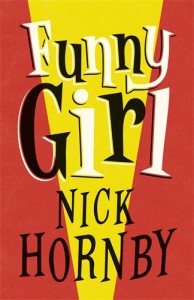
A mismatched couple is at the centre of his latest novel: set in mid-1960s London, Barbara is a buxom blonde from Blackpool with conservative sentiments; Jim a left-leaning Home Counties fellow with a job (under the then Labour government) at Number Ten. But as Barbara and Jim are the central characters of a highly successful TV sitcom, the reader gets to know them at one step removed: via the actors, Sophie (previously Barbara, the five-minute Miss Blackpool and the eponymous funny girl) and Clive (licking his narcissistic wounds at being relegated to the supporting role); writers, Tony and Bill, who meet in a police holding cell during their national service, kindred spirits who gradually drift apart; and the Oxbridge-educated director, Dennis, constantly challenged to defend his devotion to comedy within the still somewhat snobbish BBC.
I’d reached the home stretch when Charli Mills posed her latest flash-fiction challenge to write a 99-word story inspired by a muse. Nick Hornby seems to be the kind of writer who finds his muse in other art forms, particularly contemporary music and, I’ll grudgingly admit, sport. In Funny Girl, the actor Sophie/Barbara is the creative spark that pushes Tony and Bill to discard their original script and come up with something startlingly new. While the novel challenges the notion that only men can be funny, the woman is still given the traditional role of muse to the men.
The Pre-Raphaelite painters often used the same women over and over as the model for their artwork. Wandering around art galleries, I’ve wondered about the women assigned the role of Pre-Raphaelite muse. How would it affect the sense of self to be the springboard for another’s creativity? Would one feel valued or abused?
Apologies for the abrupt change of tone, I think I might have turned Pre-Raphaelite myself:
I hungered for his ardent gaze, his all-encompassing concentration. What lover would regard me so intently? What mirror reflect such light? I did not tire to stand just so while he found my essence in his canvas.
So when he chose another muse I thought I’d drown, Ophelia-like, singing in a stream of flowers.





















 RSS Feed
RSS Feed





















